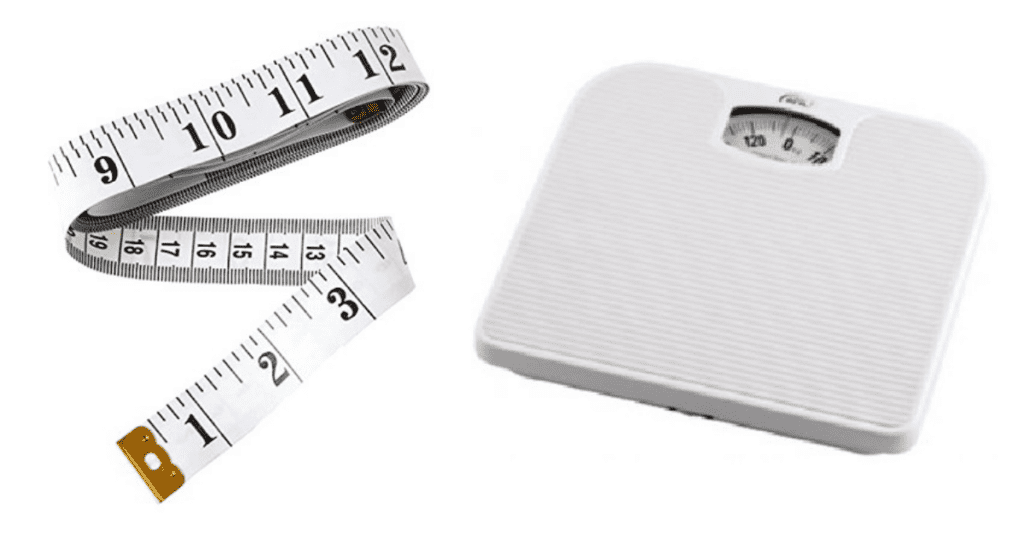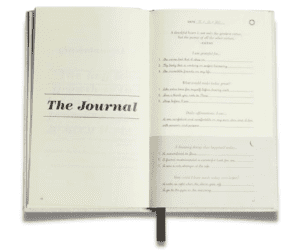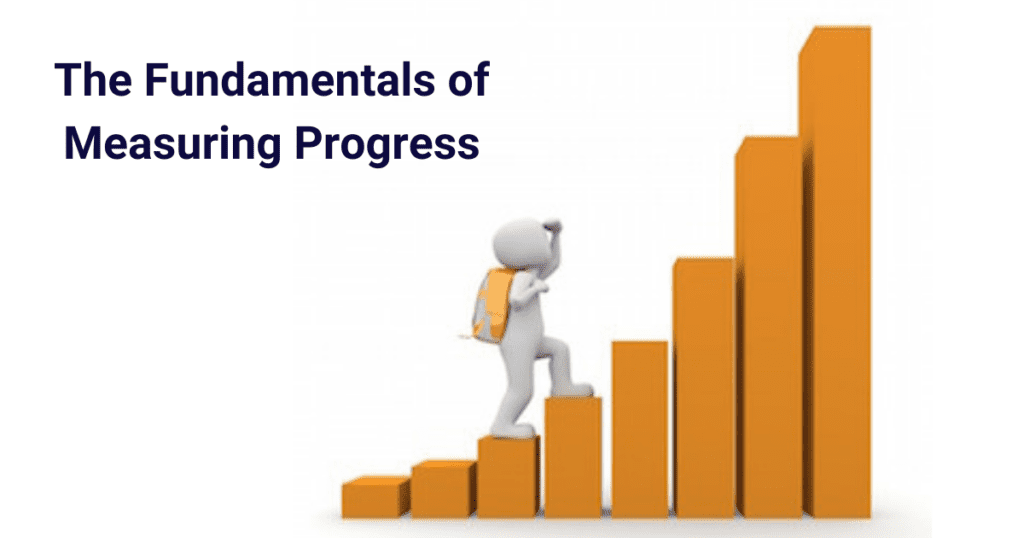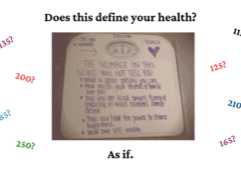Fundamentals of Measuring Progress: it’s not always about the numbers
Have you ever wondered if you’re making any progress towards your fitness goal? Perhaps you have started thinking that your training time isn’t having the effect on your muscles that you expected. Maybe the scale is not moving and you’re already thinking about changing your diet. If that is the case, wait a minute!! Measuring progress is not always about the numbers. Maybe you ARE making progress and you’re just not noticing it!
Your expectations about progress
The usual suspects that you go to for “the truth” about your progress are usually one or many of the following:
- The number on the scale
- Waistline measurements
- Weight lifted
- The number on the stopwatch

I guess you see a pattern here, right? Yes, lots of numbers! Although I consider myself a number-oriented person, very accustomed to working using my engineering profile, I have to admit that numbers can sometimes lie.
Don’t get me wrong, let me explain what I mean!
The number on the scale
Well, I am assuming that you are using the same scale, weighing yourself during the same conditions every time and that the scale is correctly calibrated. I’m also considering:
- That you already know that your body’s weight varies during the day, day by day, due to different factors
- and that you are already taking into account that you have to consider the tendency (one, two, or even three weeks) of the scale rather than single-day fluctuation of weight.
Even so, the number on the scale may not move for a while, not reflecting your REAL progress. For instance, you could be gaining muscle and then losing fat, leading to a stalemate in your progress towards your desired goal. More so, maybe you have panicked because you saw an effect on your weight that perhaps has been due to being constipated or retaining water during the last week. These and other factors can easily deceive you.
Do not worry, there are other ways to tell that you are making progress even when pounds have not been lost (or gained, depending on your goals). We will check them in a bit.
The number on the waistline measure
Again, I am assuming that human error has been avoided at all costs, maybe by having a professional measure you under the same conditions each time.
This indicator could mostly apply to those who want to lose some fat on the belly. However, the waistline is not the only part of the body where fat is accumulated. It could be a good indicator for some people in certain conditions, but could have much less meaning for others. Everyone is different since body types vary from person to person. If this measurement isn’t changing. don’t let it be the only thing you focus your efforts on.
The number of the lifted weight
For those of us who like to train and lift heavy ssshhh…ining barbells with big plates, increasing that number on your Back Squat, Deadlift, Bench Press, Shoulder Press, Clean and Jerk, Snatch, etc, could become a serious fixation. This also applies to many others who like to see their efforts at the gym reflected in what they lift.
Nevertheless, and this comes from my own experience, those numbers may become very hard to improve over time. Most of us dread even saying the word “plateau”, which popularly defines that state where your numbers in the training room are not improving even when you keep training as hard as you can.
Again, coming from my own experience, do not let this be your only focus for deciding whether there is success in your training time.
The number on the stopwatch
For those of you who like to run, swim, ride a bike, row a single scull, or do similar sports, the number on the clock might as well be your best indicator of improvement. Ok, some may use distance as well, I know, but we usually want to run a certain length faster.
Yes, I get it, if you are competing to be in the Olympics, you want to be the fastest possible. On the other hand, if you are doing this for fun… well, maybe putting all your chips into beating the timer may spoil all the fun at some point, and could have unintended consequences on your health goals.
Other ways to know you are making progress
Well then, what other ways could I use to know I am making progress? Here are a few that I like the most. You’re:
- feeling less pain or stay injury-free
- experience more energy and a better mood
- noticing increased sex drive
- having improved productivity and focus
- sleeping better
- eating healthier food
- enjoying more flexibility and/or mobility than before

You feel less pain or stay injury-free
Lots of people have some ache that haunts them occasionally, or even way too frequently. Back pain, knee pain, neck pain, and more could be part of your daily routine. Sometimes one of these appear at specific times. Perhaps you train two weeks, and then have to stop for two weeks to recover before you can start again… ever had that ever happened to you?
More often than not, we get used to some sort of discomfort, or even pain, and convince ourselves that this is “normal”. Well, it may be common, but it sure isn’t normal. Life should be pain-free. Past injuries can become recurrent if not healed well and you should make it a priority to adjust your behavior to help alleviate any harm previously taken.
So, if you once had a nagging pain in a joint or in your muscles, had daylong headaches, had to deal with unhealed wounds or any other discomfort which your healthy habits are helping to cope with, then THAT is progress. Good nutrition, exercising, quality sleep, staying away from unnecessary stress, among others, can help you live a pain-free life.
You experience more energy and a better mood
Were you an irritable person before starting to exercise but now feel full of joy and living a good life? Did you feel like you lacked the energy to complete the day after lunch at work, but now you have enough energy to finish work on time and then take the kids to practice sports?
Exercising correctly and enjoying good nutrition help increase the release of hormones that make you feel good, as well as rev up your metabolism and make you feel like being more active. You have to admit that feeling more energetic and enjoying your life more can definitely be considered to be going in the right direction for your health.
Your sex drive has increased
Are you feeling a little bit more… enthusiastic about being together with your spouse? Maybe the room gets hotter when someone you find attractive comes in. Perhaps your performance in the… ahem, physical expression of romance has improved. Well, that could mean some progress on your health.
A healthy body produces a balanced mix of hormones that not only help develop muscle and good usage of our energy, but can also give us a vigorous libido. Since reproduction requires energy and other favorable conditions, our body monitors these elements and then determines whether it is safe to promote it or not. A healthy human being in their reproductive years is fit to procreate, which, in short, leads to a finely tuned sex drive. You have to admit that “having the hots” is a good indicator that now you are somewhere between “wellness” and “fitness”.
Your productivity and focus has improved
I have heard many times phrases like:
“I don’t want to skip today’s morning training, else I won’t be as proactive at work”
or
“Now that I eat a good breakfast and avoid fast food at lunch, I feel much more focused on my daily tasks.”
The mind working well is a good indicator of a body that has been taken care of.
Your brain needs lots of energy to work and a good balance of vitamins, minerals, and different elements to stay on point. A bad diet and a sedentary life will not provide the best conditions for being mentally sharp.
Therefore, if a lethargic 10:00 am morning coffee at work to keep you moving suddenly turns into a 10:00 am finish of your first deliverable, then that's a win. If you struggled to study for your exam because you were yawning at 10:00 pm and still had a few hours more of study, but now you just finished studying before 9:00 pm and are ready to hit the bed in half an hour, then you are already gaining something.
You are sleeping better
Sleep apnea, insomnia, waking up in the middle of the night, lack of deep sleep, and other symptoms are signs that something is not quite right in your daily habits. Once you dial in your nutrition, manage your stress, and start moving more, these symptoms would most likely start to go away.
A good, deep, long, quality sleep is vital, for your progress and health in general. Sleep is paramount in your recovery and it gets you ready to tackle each day. Your lifestyle influences how well you sleep which then influences your lifestyle. It is a full circle, so make sure enough quality sleep is a priority.
You are eating healthier food
Wait, wasn’t that what I was supposed to be doing to experience some progress? Yes, indeed. However, if you eat a donut and caramel macchiato breakfast, a burrito and a large soda for lunch, and spicy BBQ ribs with fries and a few beers before hitting the sack, then it might be a long journey to start having scrambled eggs, fruit and regular coffee for breakfast; chicken breast and salad with one small bottled water for lunch and homemade stew with one glass of wine for dinner.
Change takes time. Notice when you have made a change, account for it, and even celebrate it if you wish. Start small, then you will hit your goals in the long run. Progress comes from those small steps you take in the right direction. You do not need to achieve a big win to consider it progress, you are:
- already advancing towards the right direction when you choose a diet soda instead of a regular one
- developing a better behavior when you replace the can of sausages with a lean cut of meat
- already a winner when you skip the ready-to-go microwave meal for a homemade dish with veggies and good sources of protein and healthier fat.
You have more flexibility and/or mobility than before
I know a few gym enthusiasts that train every day, lift weights, and have muscles but cannot scratch their backs. Or, even worse, they get injured once they try to play a sport. Oh, and I know lots of sedentary people who happen to have the exact same problems and many more.
In any case, improvement in your capacity to move and exert force does not only relate to how much you can lift, but also has to do with how well you can move and reach certain positions. For the latter, flexibility and mobility are key.
I'm not saying that you need to be like the contortionist who performs at the circus. You don’t even need to be close to becoming a stretching coach or an advanced yoga student. However, you do need to have some basic capabilities that allow you to perform some house chores or play some sports during your leisure time
Improvement is easy to notice. For example: if you weren’t able to touch your toes and now you can. A more substantial improvement might come when, after not being able to lower your pelvis below the level of your knees, now you can feel your hamstrings touching your calves. Just try to notice whenever changes like this happen. That’s progress.
Measuring progress: Keep a journal so you can notice it
Yes, you can write how much you weighed, your waistline, the contour of your biceps and your thighs, etc. Just remember there are many measurements you could use, pick the ones you prefer the most and be open to using a few more.
For those who love lifting weights, writing down how much weight you lifted that day is one of the first things you do. If that number hasn’t changed in some time, you could benefit from knowing how many more repetitions were you able to do with a specific weight. Maybe you can still only make 1 “rep” with 50Kg but now you can make 9 “reps” instead of 8 with 40Kg. Even taking less rest between series is an indicator of improvement. Maybe you finished your whole routine in less time and did not consider that meant progress!!

A few more qualitative indicators could be, How did you feel:
- before sleeping/eating/training? Why do you think you felt that way?
- while sleeping/eating/training? Why do you think you felt that way?
- after sleeping/eating/training? Why do you think you felt that way?
- at the beginning of the day/during the morning/in the afternoon/before going to bed?
This information will help you notice improvements in your perception of yourself. You might have experienced uncomfortable days at the beginning of your journey towards a healthier life to joyful and very productive days as time goes on.
You should also contemplate measuring progress by taking notes on:
- Previous and new injuries
- Shifts in eating habits
- How your sleep hours may have changed
- Stress symptoms you used to experience compared to now
- Other indicators you may think tell YOUR story
Additional Considerations
Here are a few pieces of advice you may wish to take:
Set goals!
When you aim for something, plan around it, set a few milestones, and measure your progress, you can make sure not to miss whenever you are getting closer to achieving what you desire.
Test and re-test
Some progress requires specific probing of where you are at the moment compared to where you were before. There are many different ways to test yourself. For example, re-do a specific workout set that you did 3 months ago and you may very likely discover improvement of your time/weights/repetitions/other).
Make yourself accountable to others
Letting others in on your plan usually pays good rewards. You may want to tell your mom, your brother, your best friend, or any other person in your life to check up on you, and make sure you are eating your veggies and going to the gym. If that’s what you need, go for it. Perhaps merely telling someone “Hey, I decided to start going to work riding my bicycle every day” is good enough for you to feel committed to keeping your work toward your goals on track.
What’s the point of measuring progress again?
We all want to know whether or not we are getting somewhere with the effort we’re making. If you're not noticing improvements, you're not making progress. This is a key point to keep in mind as you work towards your long-term fitness goals.
And sometimes that's where numbers on the scale, weight lifted, and timed runs come into play. But, there is no one-size-fits-all method for measuring progress. You have to identify what progressing means to you and then find ways of measuring it that will help you notice all types of improvements.
Fernando Cuellar is an independent personal trainer who helps people to feel empowered to change and, through fitness training, learn how to confront their own difficult situations. Find other articles written by Fernando on his coach profile. He will help you shift to a healthier life with different approaches to discover more about yourself, and how you can get your list of health-related goals fully ticked.







